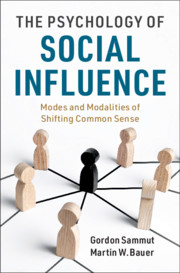The Psychology of Social Influence
This volume brings together the full range of modalities of social influence - from crowding, leadership, and norm formation to resistance and mass mediation - to set out a challenge-and-response 'cyclone' model. The authors use real-world examples to ground this model and review each modality of social influence in depth. A 'periodic table of social influence' is constructed that characterises and compares exercises of influence in practical terms. The wider implications of social influence are considered, such as how each exercise of a single modality stimulates responses from other modalities and how any everyday process is likely to arise from a mix of influences. The book demonstrates that different modalities of social influence are tactics that defend, question, and develop 'common sense' over time and offers advice to those studying in political and social movements, social change, and management.
- Provides a comprehensive treatment of social influences modalities
- Combines theories of social influence, showing how the manifestation of social influence occurs in a dynamic interplay of different modes of interaction
- Grounds various modalities of influence using practical, real-life examples
- Lays out the implications of social influence findings and how these impact other social and psychological domains of inquiry such as beliefs, attitudes, behaviour, and common sense
Reviews & endorsements
'The authors have produced an innovative, well-crafted book that skillfully guides students and experts to gain a deeper and more satisfactory understanding of the transformed nature of social influence in our fast-changing, 21st century world.' Fathali Moghaddam, Professor of Psychology, Georgetown University, and author of Mutual Radicalization
'The Psychology of Social Influence is wonderfully erudite and scholarly allowing the reader to appreciate the variety of perspectives and intellectual traditions that over time were brought to bear on social influence as a realm of phenomena … I can't think of a more comprehensive introduction to this fundamental topic of crucial importance to science and society.' Arie W. Kruglanski, Distinguished University Professor of Psychology, University of Maryland
‘[Most college students] are not yet specialists or experts and so they need a survey and guide. This book seems the best fit for meeting that need. It can serve as a textbook for teaching senior undergraduate or beginning graduate classes across the field of social and behavioral sciences.’ Hak-Soo Kim, Asian Journal for Public Opinion Research
Product details
January 2021Paperback
9781108402897
280 pages
230 × 153 × 20 mm
0.5kg
Available
Table of Contents
- 1. Modalities of social influence: preconditions (public sphere) and demarcations (non-violence)
- Part I. Eternal Resources of Populism:
- 2. Crowding: contagion and imitation
- 3. Leading: directors, dictators and dudes
- Part II. Experimental paradigms:
- 4. Norming and frames of reference
- 5. Conforming and converting
- 6. Obeying: authority and compliance
- 7. Persuading and convincing
- Part III. Necessary Extensions:
- 8. Agenda setting, framing and mass mediation
- 9. Designing and resisting artefacts
- Part IV. Theoretical Integration:
- 10. Common sense: normalisation, assimilation and accommodation
- 11. Epilogue: theoretical excursions and challenges
- References
- Index.










